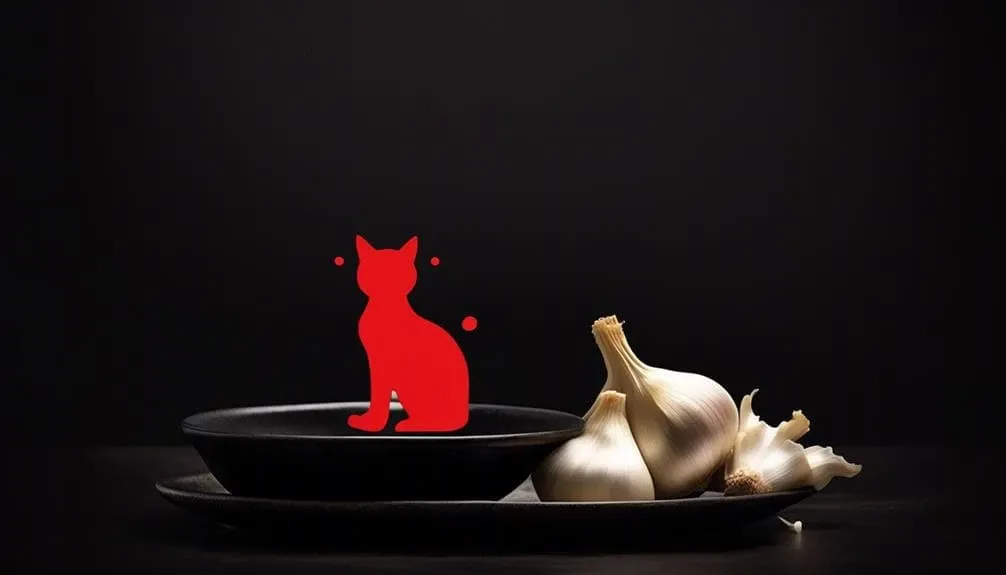The Best Fluffy Pancakes recipe you will fall in love with. Full of tips and tricks to help you make the best pancakes.

You might think that garlic is just a harmless flavor booster in your kitchen, but for cats, it's a silent assassin.
The deadly threat of garlic to our feline friends is a topic that demands our attention. The consequences of garlic toxicity can be devastating, leading to anemia and even death.
In this discussion, we will uncover the alarming truth about garlic's dangerous effects on cats and explore the necessary steps to protect them.
Trust me, you won't want to miss what you're about to discover.
Key Takeaways
- Garlic belongs to the lily family and is highly toxic to cats.
- Garlic toxicity can lead to anemia and potentially be fatal for cats.
- Signs of garlic toxicity include vomiting, diarrhea, loss of appetite, lethargy, and respiratory distress.
- Immediate veterinary care is necessary if a cat has ingested garlic, regardless of whether symptoms are present.
Garlic Toxicity: Understanding the Risks
To fully comprehend the potential dangers of garlic toxicity in cats, it's crucial to understand the specific risks associated with the ingestion of garlic.
Garlic toxicity can have long term effects on cats, particularly when it comes to their red blood cells. All cat breeds are susceptible to the toxic effects of garlic, although some may be more sensitive than others.
The impact of garlic toxicity can vary among different breeds, with some showing more severe symptoms than others. It's important to note that even small amounts of garlic can be harmful to cats and may lead to serious health issues.
Therefore, it's essential to be vigilant and ensure that garlic is kept out of reach of your feline companions to prevent any potential harm.
Recognizing the Signs of Garlic Toxicity
Understanding the risks associated with garlic toxicity in cats, it's crucial to be able to recognize the signs of this dangerous condition. Here are the signs of garlic toxicity to look out for:
- Vomiting and diarrhea: Cats may experience gastrointestinal distress, which can manifest as vomiting and diarrhea.
- Loss of appetite: Garlic toxicity can cause a decrease in appetite, leading to weight loss and malnutrition.
- Lethargy: Cats affected by garlic toxicity may appear weak, tired, and lack energy.
- Pale gums: The destruction of red blood cells caused by garlic toxicity can result in pale gums, indicating anemia.
It is important to note that there are common misconceptions about garlic and cats. Contrary to popular belief, small amounts of garlic aren't safe for cats. Even a small ingestion can be toxic and potentially fatal. If you notice any of these signs, it's vital to seek veterinary care immediately.
Seeking Immediate Veterinary Care for Garlic Toxicity
If you suspect that your cat has ingested garlic and is showing signs of toxicity, it's crucial to seek immediate veterinary care. Early intervention is of utmost importance in garlic poisoning cases to prevent further complications and potential death. Garlic toxicity can quickly lead to anemia and other serious health issues in cats, so it's essential to act swiftly.
By seeking veterinary care promptly, you can ensure that your cat receives the necessary treatment and supportive care to minimize the effects of garlic toxicity.
Additionally, education plays a vital role in preventing garlic toxicity in cats. By informing family members and visitors about the dangers of garlic and taking proactive measures to keep garlic and other toxic foods out of reach, you can help safeguard your feline companion from potential harm.
Treatment Options for Cats With Garlic Toxicity
Treatment options for cats with garlic toxicity may vary depending on the severity of the poisoning and the specific symptoms exhibited by the cat. Here are some possible treatment options:
- Inducing vomiting: If the cat has recently ingested garlic, the veterinarian may induce vomiting to remove the toxin from the stomach.
- Fluid therapy: Cats with garlic toxicity are often dehydrated and may require intravenous fluids to restore hydration and electrolyte balance.
- Blood transfusion: In severe cases, where the cat's red blood cells have been significantly damaged, a blood transfusion may be necessary to replace the damaged cells.
- Supportive care: This may include medications to manage symptoms such as vomiting and diarrhea, as well as monitoring the cat's vital signs and providing a quiet, stress-free environment.
It is important to note that complications can arise from garlic toxicity, such as anemia and organ damage. The management of these complications will vary depending on the individual cat's condition and may require additional treatment options.
Always consult with a veterinarian for proper diagnosis and treatment of garlic toxicity in cats.
Preventing Garlic Toxicity in Your Feline Companion
To prevent garlic toxicity in your feline companion, ensure that garlic and other toxic foods are kept securely out of reach. Cats are curious creatures and may be tempted to investigate and consume foods that are harmful to them. Store garlic securely, away from your pets, and be cautious of garlic in prepared foods.
Educate family members and visitors about the dangers of garlic for cats, emphasizing the importance of keeping it away from your feline friend. Consider using pet-safe alternatives for flavoring food instead of garlic. There are various garlic alternatives available that can add flavor to your cat's meals without posing a risk to their health.
Conclusion
In conclusion, it's crucial for cat owners to be aware of the grave danger that garlic poses to their feline companions. Garlic toxicity in cats can lead to severe health consequences, including anemia and even death.
Recognizing the signs of garlic toxicity and seeking immediate veterinary care is essential for early intervention.
By taking the necessary precautions and avoiding any exposure to garlic, cat owners can protect their beloved pets from this deadly threat.
Stay informed and keep your feline friends safe.








